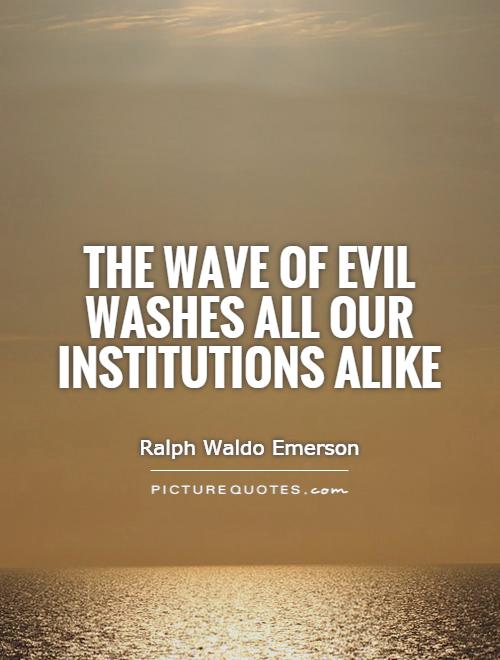The wave of evil washes all our institutions alike

The wave of evil washes all our institutions alike
Ralph Waldo Emerson, a renowned American essayist, lecturer, and poet, was known for his transcendentalist philosophy that emphasized the importance of individualism, self-reliance, and the interconnectedness of all living beings. In his works, Emerson often explored the idea that evil is a pervasive force that can corrupt and undermine even the most well-established institutions.Emerson believed that evil was not simply a personal failing or moral weakness, but rather a systemic problem that could infect and erode the foundations of society. He argued that the wave of evil could wash over all institutions alike, from government and religion to education and the arts. In his essay "Self-Reliance," Emerson wrote, "Society everywhere is in conspiracy against the manhood of every one of its members. Society is a joint-stock company, in which the members agree, for the better securing of his bread to each shareholder, to surrender the liberty and culture of the eater. The virtue in most request is conformity. Self-reliance is its aversion. It loves not realities and creators, but names and customs."
Emerson believed that institutions, by their very nature, tended to promote conformity and discourage individuality. He saw this as a form of evil that stifled creativity, innovation, and personal growth. He argued that people should resist the pressure to conform and instead trust in their own instincts and beliefs. In doing so, they could overcome the wave of evil that threatened to engulf them and their society.
Emerson's ideas about the wave of evil washing over institutions can be seen as a warning against the dangers of blind conformity and the erosion of individual freedom. He believed that people should strive to be true to themselves and resist the forces that sought to control and manipulate them. By embracing self-reliance and independence, individuals could protect themselves from the corrupting influence of evil and help to build a more just and equitable society.












 Friendship Quotes
Friendship Quotes Love Quotes
Love Quotes Life Quotes
Life Quotes Funny Quotes
Funny Quotes Motivational Quotes
Motivational Quotes Inspirational Quotes
Inspirational Quotes